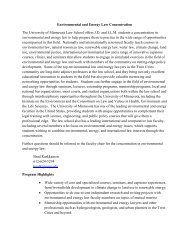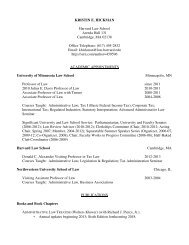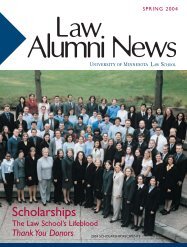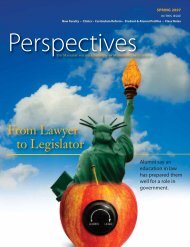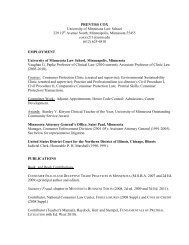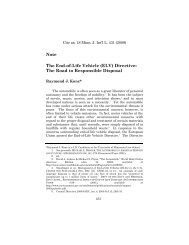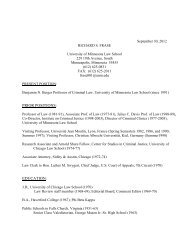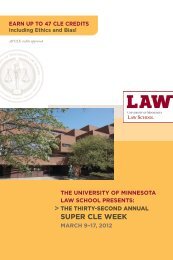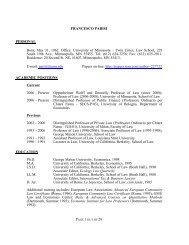Enabling Private Ordering - the University of Minnesota Law School
Enabling Private Ordering - the University of Minnesota Law School
Enabling Private Ordering - the University of Minnesota Law School
You also want an ePaper? Increase the reach of your titles
YUMPU automatically turns print PDFs into web optimized ePapers that Google loves.
82 MINNESOTA JOURNAL OF INT’L LAW [Vol. 18:1<br />
contract by <strong>the</strong> host State that impose additional obligations or<br />
interfere with established contractual rights can thus be<br />
justified by showing that <strong>the</strong> parties do not assume <strong>the</strong> full costs<br />
<strong>of</strong> <strong>the</strong>ir behavior, but instead impose social costs on third<br />
parties. 228 The imposition <strong>of</strong> additional obligations—through<br />
subsequent regulation—to protect <strong>the</strong> environment, <strong>the</strong><br />
investor’s employees, or not to interfere with competition, can<br />
thus be justified from an economic perspective with <strong>the</strong><br />
externalities created by <strong>the</strong> parties’ behavior. 229 Such regulation<br />
<strong>of</strong> investor-State contracts will <strong>the</strong>refore not constitute a<br />
violation <strong>of</strong> an umbrella clause that engages <strong>the</strong> host State’s<br />
international responsibility for unlawful behavior. By contrast,<br />
if <strong>the</strong> regulation <strong>of</strong> investor-State contracts constitutes<br />
disguised opportunistic behavior <strong>of</strong> <strong>the</strong> host State that does not<br />
aim at fur<strong>the</strong>ring a public interest but at enriching <strong>the</strong> host<br />
State’s budget, <strong>the</strong> State’s international responsibility for<br />
violation <strong>of</strong> an umbrella clause will be engaged. 230 It is, thus,<br />
necessary to distinguish meticulously between regulatory<br />
behavior and opportunism in order to avoid general regulation<br />
that is merely used as a pretext to change <strong>the</strong> contractual<br />
equilibrium to <strong>the</strong> detriment <strong>of</strong> foreign investors.<br />
A different issue concerns <strong>the</strong> question <strong>of</strong> whe<strong>the</strong>r <strong>the</strong> host<br />
State, in case <strong>of</strong> non-opportunistic and thus, as regards <strong>the</strong><br />
functioning <strong>of</strong> umbrella clauses, generally permissible<br />
regulation <strong>of</strong> investor-State contracts, has to provide<br />
compensation. This will depend on a number <strong>of</strong> factors,<br />
including <strong>the</strong> importance <strong>of</strong> <strong>the</strong> public interest at play, <strong>the</strong><br />
degree and <strong>the</strong> consequences <strong>of</strong> <strong>the</strong> interference with an<br />
investor-State contract, <strong>the</strong> existence <strong>of</strong> alternative, less<br />
restrictive measures, <strong>the</strong> question <strong>of</strong> whe<strong>the</strong>r, and to what<br />
degree, <strong>the</strong> investor’s behavior harms competing rights and<br />
interests, etc. These aspects can come into play via a balancing<br />
or proportionality analysis that weighs <strong>the</strong> public interests<br />
against those <strong>of</strong> <strong>the</strong> foreign investor. 231 Consequently, <strong>the</strong><br />
228. See Ronald H. Coase, The Problem <strong>of</strong> Social Costs, 3 J. L. & ECON. 1 (1960).<br />
229. Cf. Schwartz, supra note 35, at 555.<br />
230. In <strong>the</strong> event that <strong>the</strong> host State derives a direct benefit from <strong>the</strong> regulation<br />
one could depart from a refutable presumption that <strong>the</strong> regulation constitutes<br />
opportunistic behavior and thus requires compensation. See Sedco, Inc. v. NIOC<br />
(Iran), 9 Iran-U.S. Cl. Trib. Rep. 248, 274−79 (1985), for a parallel case concerning<br />
<strong>the</strong> regulation <strong>of</strong> property, where <strong>the</strong> Iran-United States Claims Tribunal<br />
established such a presumption.<br />
231. See generally Alec Stone Sweet & Jud Ma<strong>the</strong>ws, Proportionality Balancing<br />
and Global Constitutionalism, Yale <strong>Law</strong> <strong>School</strong> Faculty Scholarship Series No. 14



